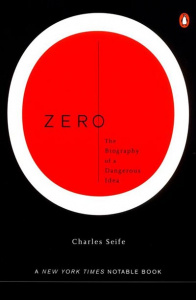Zero: The Biography of a Dangerous Idea
 By Charles Seife
By Charles Seife
Review by Octavian (Computer Science)
Can you imagine “nothing”? Focusing on this concept, even trying to imagine it, is hair-raising. It is a feeling of emptiness. You might be shocked to discover that the number zero is only recently a recognised part of the world we live in. In Zero: The Biography of a Dangerous Idea you can go through the history of the symbol for “nothing” and its massive implications for mankind past, present and future. This apparently insignificant number has challenged people, from mathematicians to philosophers and theologians.
Containing accessible mathematical concepts, the book is not just a boring history lesson. What really struck me is the close connection between philosophy and sciences. The impossibility of people to comprehend zero (is it the lack of something? is it just nothing, void?), an entity that generates paradoxes (divide something by nothing and you get everything) almost put science evolution on hold. It is shocking!
I don’t want to spoil any part of the book or go into any maths related parts, but one of the simplest examples of side effects of not embracing zero in our life is actually the calendar (an example which actually took me by surprise). Because there is no year zero (from 1BC we go straight to 1AD) we actually got in the Third Millennium on 1st January 2001, not 2000 as all of us celebrated. It seems a minor thing, but our denial of zero has managed to trick billions of people using Gregorian calendar. We lived a lie!
I highly recommend the book because of its humorous approach of a serious subject, a book that might even open the appetite for philosophy. The entire book is an unexpected bridge between mathematical theory and real life, with its entire implications, everything caused by a single number: zero.
Zero: The Biography of a Dangerous Idea by Charles Seife
ISBN-10: 0285635948
ISBN-13: 9780285635944
Try checking the availability of this book at your school or local library or explore second hand bookshops and websites. You may also wish to purchase from either Amazon or Blackwell’s.
